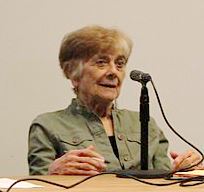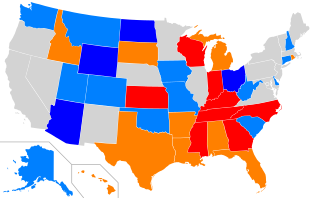Related Research Articles
Electoral fraud, sometimes referred to as election manipulation, voter fraud or vote rigging, involves illegal interference with the process of an election, either by increasing the vote share of a favored candidate, depressing the vote share of rival candidates, or both. It differs from but often goes hand-in-hand with voter suppression. What exactly constitutes electoral fraud varies from country to country.

Voter suppression is a strategy used to influence the outcome of an election by discouraging or preventing specific groups of people from voting. It is distinguished from political campaigning in that campaigning attempts to change likely voting behavior by changing the opinions of potential voters through persuasion and organization, activating otherwise inactive voters, or registering new supporters. Voter suppression, instead, attempts to gain an advantage by reducing the turnout of certain voters. Suppression is an anti-democratic tactic associated with authoritarianism. Some argue the term 'voter suppression' downplays the harm done when voices aren't reflected in an election, calling for terms like 'vote destruction' that accounts for the permanence of each vote not being cast.
Benjamin L. Ginsberg is an American lawyer. He is most well known for his work representing the Republican Party and its political campaigns, candidates, members of Congress and state legislatures and governors, as well as corporations, trade associations, businesses, and individuals participating in the political process.

A special election was held in California's 50th congressional district to choose a new member of the U.S. Representative to fill the vacancy caused by the resignation of Republican Randy Cunningham, who resigned November 28, 2005 after pleading guilty to bribery, wire fraud, mail fraud, and tax evasion charges..

Kris William Kobach is an American lawyer and politician who is the Attorney General of Kansas. He previously served as the 31st Secretary of State of Kansas. A former Chairman of the Kansas Republican Party, Kobach came to national prominence over his support for immigration controls, including involvement in the implementation of high-profile anti-illegal immigration ordinances in various American cities. Kobach is also known for his calls for stronger voter ID laws in the United States, reinstating the National Security Entry-Exit Registration System, and his advocacy for anti-abortion legislation. He has made claims about the extent of voter fraud in the United States that studies and fact-checkers have concluded are false or unsubstantiated.

Hans Anatol von Spakovsky is an American attorney and a former member of the Federal Election Commission (FEC). He is the manager of The Heritage Foundation's Election Law Reform Initiative and a senior legal fellow in The Heritage Foundation's Meese Center for Legal and Judicial Studies. He is an advocate for more restrictive voting laws. He has been described as playing an influential role in making unfounded concern about voter fraud mainstream in the Republican Party. His work, which claims voting fraud is rampant, is controversial as it has been found to be fraught with misleading statistics.

Frances Fox Piven is an American professor of political science and sociology at The Graduate Center, City University of New York, where she has taught since 1982.

Anne R. Kaiser is an American politician from the state of Maryland who serves in the Maryland House of Delegates, where she represents the 14th district, which includes parts of Silver Spring, Calverton, Colesville, Cloverly, Fairland, Burtonsville, Spencerville, Olney, Brookeville, Ashton-Sandy Spring, Brinklow, Laytonsville, Sunshine, Goshen, and Damascus in Montgomery County.

Jocelyn Benson is an American activist, politician, and former academic administrator. She is the 43rd Secretary of State of Michigan. Benson is a former dean of Wayne State University Law School, a co-founder of the Military Spouses of Michigan, and a board member of the Ross Initiative in Sports for Equality. She is the author of State Secretaries of State: Guardians of the Democratic Process (2010).
John Christian Adams is an American attorney and conservative activist formerly employed by the United States Department of Justice under the George W. Bush administration. Since leaving the DOJ, Adams has become notable for making alarmist and false claims about the extent of voter fraud in the United States. He has falsely accused a number of legitimate voters of being fraudulent, and has published information about them online, including Social Security numbers.

Dianna Duran is an American politician who served as the 24th Secretary of State of New Mexico. A Republican, she was the first member of her party in 80 years to serve in the position. On October 22, 2015, she resigned her position amid a corruption and campaign law investigation. She subsequently pleaded guilty to six of 65 fraud and embezzlement charges against her as part of an agreement reached with the Attorney General of New Mexico. Duran was sentenced to 30 days in jail and began her sentence on December 18, 2015.

Voter ID laws in the United States are laws that require a person to provide some form of official identification before they are permitted to register to vote, receive a ballot for an election, or to actually vote in elections in the United States.

Voter suppression in the United States consists of various legal and illegal efforts to prevent eligible citizens from exercising their right to vote. Such voter suppression efforts vary by state, local government, precinct, and election. Voter suppression has historically been used for racial, economic, gender, age and disability discrimination. Before and during the American Civil War, most African-Americans had not been able to vote. After the Civil War, all African-American men were granted voting rights, causing some Southern Democrats and former Confederate states to institute actions such as poll taxes or language tests that were ostensibly not in contradiction to the U.S. Constitution at the time, but were used to limit and suppress voting access, most notably African American communities that made up large proportions of the population in those areas, but in many regions the majority of the electorate as a whole was functionally or officially unable to register to vote or unable to cast a ballot. African Americans' access to registration and voting in the South was often difficult until the Civil Rights Act of 1964, and continues to be a subject of debate.
Voter impersonation, also sometimes called in-person voter fraud, is a form of electoral fraud in which a person who is eligible to vote in an election votes more than once, or a person who is not eligible to vote does so by voting under the name of an eligible voter. In the United States, voter ID laws have been enacted in a number of states by Republican legislatures and governors since 2010 with the purported aim of preventing voter impersonation. Existing research and evidence shows that voter impersonation is extremely rare. Between 2000 and 2014, there were only 31 documented instances of voter impersonation. There is no evidence that it has changed the result of any election. In April 2020, a voter fraud study covering 20 years by the Massachusetts Institute of Technology found the level of mail-in ballot fraud "exceedingly rare" since it occurs only in "0.00006 percent" of individual votes nationally, and, in one state, "0.000004 percent — about five times less likely than getting hit by lightning in the United States."
Justin Levitt is an American constitutional law scholar and professor at Loyola Law School. In September 2015, he left Loyola Law School to become the Deputy Assistant Attorney General in the United States Department of Justice Civil Rights Division. He returned to the faculty of Loyola until early 2017.

John Robert "Jay" Ashcroft is an American attorney, engineer and politician serving as the 40th and current Secretary of State of Missouri since 2017. A member of the Republican Party, he is the son of former U.S. Attorney General John Ashcroft.

The Presidential Advisory Commission on Election Integrity, also called the Voter Fraud Commission, was a Presidential Commission established by Donald Trump that ran from May 11, 2017, to January 3, 2018. The Trump administration said the commission would review claims of voter fraud, improper registration, and voter suppression. The establishment of the commission followed Trump's false claim that millions of illegal immigrants had voted in the 2016 presidential election, costing him the popular vote. Vice President Mike Pence was chosen as chair of the commission and Kansas Secretary of State Kris Kobach was its vice chair and day-to-day administrator.

Fish v. Kobach was a 2018 bench trial in the United States District Court for the District of Kansas in which five Kansas residents and the League of Women Voters contested the legality of the Documentary Proof of Citizenship (DPOC) requirement of the Kansas Secure and Fair Elections (SAFE) Act, which was enacted in 2011 and took effect in 2013.

The 2018 election in North Carolina's 9th congressional district was held on November 6, 2018, to elect a member for North Carolina's 9th congressional district to the United States House of Representatives.
References
- ↑ "Lorraine Minnite". Scholars Strategy Network. Retrieved 19 March 2016.
- 1 2 3 "Lorraine Minnite Faculty Page". Rutgers University. Retrieved 6 March 2016.
- ↑ Cohn, Nate (16 July 2012). "Will Voter ID Laws Cost Obama Reelection?". New Republic. Retrieved 19 March 2016.
- ↑ "Voter ID Laws Target Rarely Occurring Voter Fraud". Fox News. Associated Press. 24 September 2011. Retrieved 6 March 2016.
- ↑ Mayer, Jane (29 October 2012). "The Voter-Fraud Myth". The New Yorker. Retrieved 19 March 2016.
- 1 2 Bingham, Amy (12 September 2012). "Voter Fraud: Non-Existent Problem or Election-Threatening Epidemic?". ABC News. Retrieved 6 March 2016.
- ↑ Fessler, Pam (5 November 2010). "Immigrant Voter Fraud Fears Didn't Materialize". NPR. Retrieved 6 March 2016.
- ↑ Hewlett, Michael (23 July 2015). "Rutgers professor testifies in federal that voter fraud is rare". Winston-Salem Journal. Retrieved 6 March 2016.